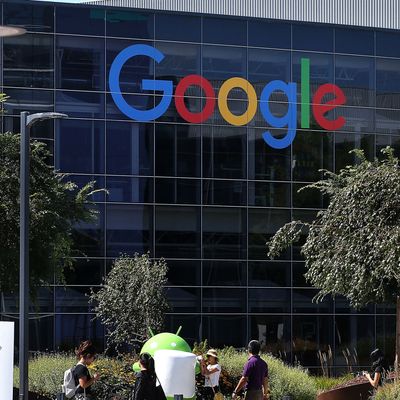
It can be hard when I write about tech companies not to feel a bit like my parents. Specifically because when the companies misbehave I find myself repeating a dreaded question from my childhood: Okay, little Google, are you really sorry, or are you just sorry you got caught?
This month, the thing — or at least one of the things — Google got caught doing was providing tens of thousands of dollars in free advertising to anti-abortion causes. Since 2011, the Obria Group has received roughly $150,000 in free ads via Google’s grant program, according to a report from The Guardian. The organization used those ads to market so-called crisis pregnancy centers, which provide care such as pregnancy tests and ultrasounds but offer counseling, often involving scare tactics, to deter people from getting abortions. Despite what the ads implied, these centers do not in fact offer abortions but are often located near actual abortion providers like Planned Parenthood. (The Obria Group gets its funding from Catholic organizations.) The idea here being to lure pregnant people seeking to terminate or considering terminating their pregnancies into the center and convince them not to get the abortion they were Googling about in the first place.
After the report, Google told The Guardian it gave those free advertisements to “a diverse group that represents many different views and different causes.” Two weeks later, the company announced it would be modifying its ad policies for pro-choice and anti-abortion groups in the United States, the United Kingdom, and Ireland. Now advertisers running ads about abortion will have to certify with Google about whether they actually provide it. Google says it will verify this information and then, once approved, ads from those organizations will run with a disclosure. “Google will automatically generate one of the following in-ad disclosures for your abortion product or service ads: “Provides abortions” or “Does not provide abortions.” This change will become effective in June.
It’s been only a few weeks since the last time it took media attention and news-cycle outcry to ensure that a tech company lived up to its stated policies and principles. At the beginning of March, a report from Wired found Amazon was selling books peddling autism “cures” — autism currently has no known cure — involving the consumption of chlorine dioxide, a bleach-like substance the FDA says can cause “severe nausea, vomiting, and life-threatening low blood pressure from dehydration.” Following the report, Amazon pulled some of those books from its online store, though not all of them. It did not provide an explanation for why some remain for sale. When Adam Schiff, a congressman from California, called out Jeff Bezos, the company pulled five anti-vaxx documentaries from Amazon Prime.
In February, YouTube announced it was changing up its algorithm to reduce recommendations of “borderline content.” But the company’s years of doing nothing meant that David Hogg, a teenage survivor of the Parkland shooting, had to watch as videos claiming he was a paid crisis actor reached the top spot on YouTube’s trending page and were viewed by millions. (It’s still unclear if these reduced recommendations are actually working at scale.) Following the 2016 election, Facebook rolled out a system using third-party fact-checkers to investigate and flag disputed news posts so readers could more easily know that these contained misinformation. Facebook later pulled the program, months after researchers said it took three days to actually stop a fake news story from spreading.
The norm in Silicon Valley is to be reactive, not proactive, but it doesn’t have to be. Tech companies are run by human beings who could opt to make changes and terms of service based solely on ethics and not the latest gotcha headlines. Dream with me, folks! Facebook, for example, could choose to aggressively enforce its policies across its platform regardless of media attention — which would have meant deciding to eliminate dangerous anti-vaxx information from Instagram before the news media forced it to earlier this spring. (A purge that still hasn’t been effective, mind you.) It would have meant the people over at Google responsible for the company’s ad-grant program might have taken the time to fully consider the potentially misleading information contained in the ads they were approving. Tech companies could do this if they wanted to.
Google didn’t wake up mid-May and decide, Today is the day we fix that shady policy surrounding anti-abortion ads. It made changes — limited changes that don’t require Google to take a moral stand in any direction and that have yet to be tested in the real world — only because it got in trouble. And the quickest way to get out of trouble is to do the bare minimum so people will report on the changes and move on to the next tech company that’s doing a bad thing. A bad thing it isn’t sorry for yet but will be soon.





























